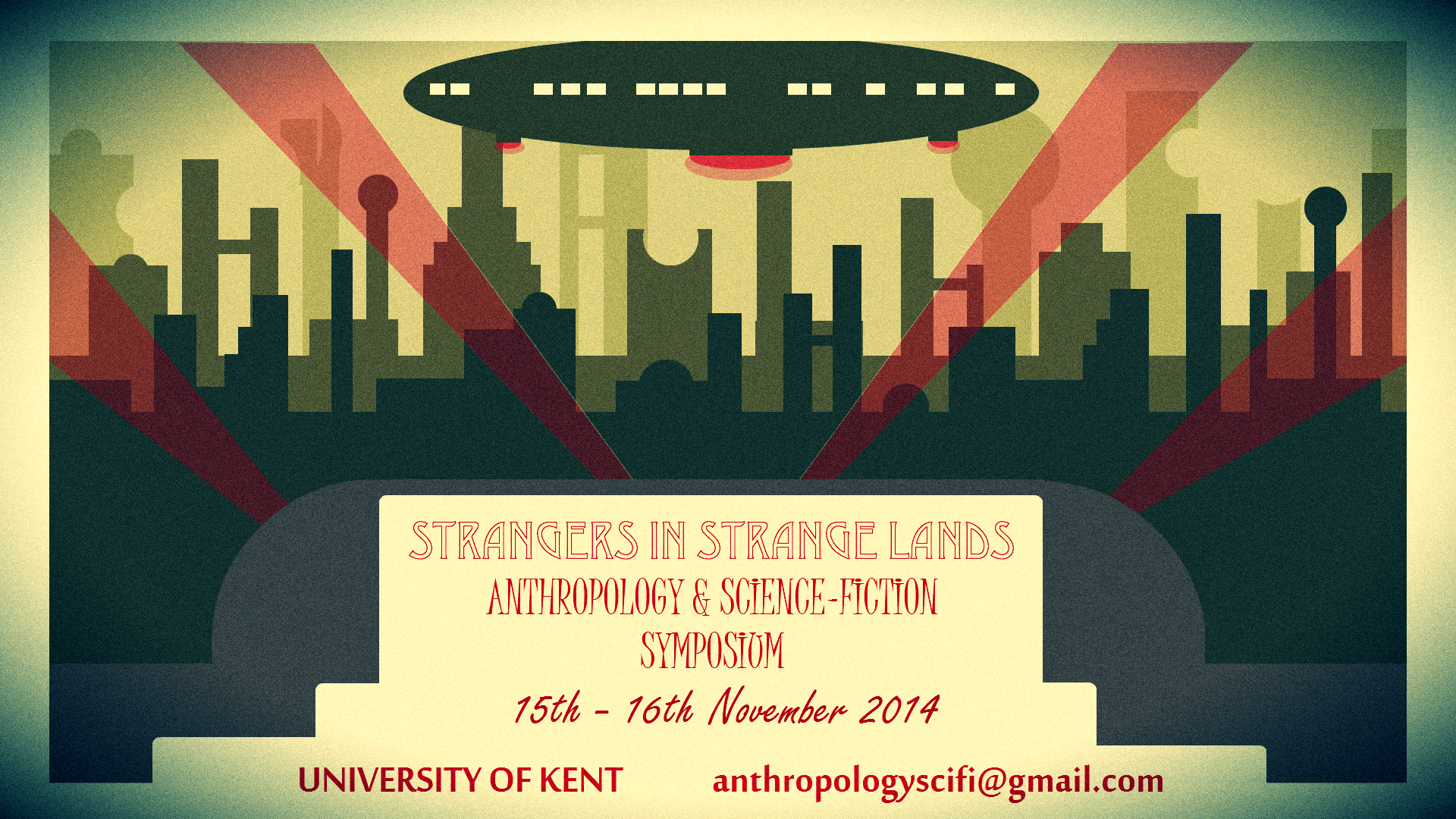Strangers in Strange Lands: Mapping the Relationship between Anthropology and Science Fiction
University of Kent, 15-16 November 2014, Canterbury, Kent
Registration for this event is still open. The conference is free, but registration is mandatory. To register please go to http://www.eventbrite.co.uk/e/strangers-in-strange-lands-tickets-13244780495.
The call for papers is now closed, and the final programme can be found here (pdf).
As part of the University of Kent’s 50th Anniversary celebrations, the School of Anthropology and Conservation at the University of Kent present “Strangers in Strange Lands: Mapping the Relationship between Anthropology and Science Fiction”, a two-day symposium organised by current and former departmental PhD students and hosted by the School of Anthropology and Conservation with sponsorship from The Science Fiction Foundation (UK).
The aim of this symposium is to promote the analysis of science fiction works as valid objects of anthropological inquiry, and in particular, as symptomatic traces of developing futures; thereby expanding the scope of anthropological scholarship. It is our intention to provide a platform for an energetic, multi-disciplinary discussion between established scholars and postgraduate students from a diverse range of institutions and disciplines.
We regard “science fiction” as the corpus of literature, film, graphic novels and video games comprising elements of both the fantastic and the uncanny (Todorov). Science fiction presents the audience with scenarios that seem familiar, rational and thus possible, while maintaining the potential to challenge our ability to believe, to make us hesitate. Therefore, in science fiction, verisimilitude is closely linked to the audience’s reactions, and their propensity to find shocking elements within the quotidian, or quotidian elements within the bizarre.
The symposium seeks to tackle the numerous relationships and parallels between science fiction and anthropology. Science fiction, like anthropology, is involved in producing discourses about societies, alterity and political imaginations. Authors in both fields attempt to convey to their readers a coherent impression of a cultural whole, presenting them with alternative social orders; an endeavour in which science fiction is perhaps more successful, at least if the size of its readership is anything to go by. One central theme of both science fiction and (classic) ethnographic texts is the notion of ‘alien’ cultures, and imaginations of ‘others’; further shared themes include estrangement with the familiar and familiarisation with the exotic, as well as more general questions pertaining to the ‘nature’ of humanity and the human condition. As such, both science fiction and anthropological writings (in particular ethnographic monographs) can challenge readers to evaluate and re-examine a wide range of contemporary problems as well as their own assumptions and beliefs.
Confirmed keynote speakers are Dolores Martinez, Emeritus Reader in Anthropology, School of Oriental and African Studies (SOAS); and Paul March-Russell, Specialist Associate Lecturer Comparative Literature, University of Kent. We are also pleased to announce that renowned science fiction author Gwyneth Jones will be a special guest speaker at this event. A round table discussion, led by Professor Bruce Kapferer, will be the closing highlight of the event.
We are interested in contributions that explore the ways in which both Science Fiction and Anthropology challenge our sense of familiarity by compelling us to question common sense notions of gender, sex, and the limits of what we consider human. We are also interested in papers that examine how Science Fiction can be used as a tool of anthropological analysis; what the futures, or alternative realities, created in science-fiction tell us about our own society; how nightmarish or utopic orders depicted in Science Fiction relate to our attitudes to technology, or ideas of progress, and can we use works of Science Fiction written in different time periods to construct an archaeology of the future? Finally, we are particularly interested in papers that explore how the parallel universes depicted in science fiction are constructed by different societies around the world: are uncanny futures imagined differently in non-Western cultures?
Suggested topics for paper presentations include, but are not limited to:
- Deconstructing the ‘Human’: challenges to the nature/culture divide, cyborgs, post-humanities
- Exotic landscapes and emerging ‘others’ in Science Fiction and Fantasy
- Accidental ethnographers: space and time travelers, ethnographic fieldwork in parallel realities
- Utopias and the limits of modern imagination: cybernetic dreams, scientific and technological imaginaries
- Dystopian futures: narratives of poverty, state surveillance, and social exclusion
- Natural disasters and future ecologies: the Anthropocene and its impacts on imaginary landscapes
- Future designs, futuristic objects (retrofuturism, future archaeologies)
- The expansion of colonial imagination: the conquest of the space and imaginary empires
- Deconstruction of gender identities: challenged roles, post-gender bodies, alternative anatomies
- ‘Othering’ the differences: monsters, hybrids and non-human relationships
- Other voices: peripheral science fiction and fantasy narratives from non-western traditions
Following the event, selected papers will be considered for post-event publication as a special edition of Foundation: The International Review of Science Fiction, or as special issue in another suitable disciplinary journal, or edited collection.

